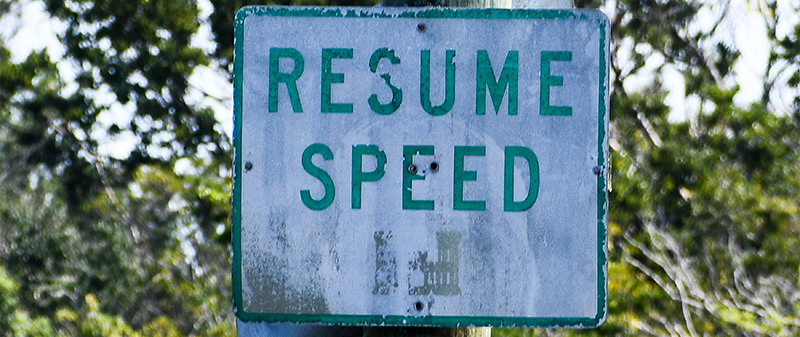Build Your Resume for Speed

Message is more important than looks.
Most resume advice is high-flown crap. The titles and introductions describe resume content and structure as a series of mystic combinations.
“Say this, don’t say that. Use this layout.” Like the magical weavings from a Robert Jordan novel, constructing a resume with just the right notes will reboot an application reviewer’s brain, causing them to place your application in the “yes” pile on pure instinct.
I call it Resume Runecarving. Like “real” runes, they may look cool but ultimately have zero magical properties.
Concerns like word choice and format are far, FAR less important than the speed and clarity of your message. In fact, those secondary concerns easily fall into place when your resume can clearly and quickly tell me just who the hell you are.
Fail Fast
In my role as Director of Engineering for New Context, I have input into every stage of the hiring process for our engineers. We are an expert-oriented consulting agency specializing in infrastructure automation and software delivery with a security-first approach. The common buzzword for these services is “DevOps” or “DevSecOps;” those terms fit with the projects we complete for our clients, but make it difficult to identify ideal engineer candidates. We have a whole class of applicants that have titles that sound like “DevOps Engineer,” yet lack skills crucial to our daily work.
Our process does a great job identifying potential fit, so we ultimately end up in the right place, but we spend a lot of time up front trying to sift through the noise coming out of resumes we review. This is bad for us and the candidate.
Contrary to popular belief, it has been my experience that most reviewers are sensitive to candidates’ time and attention. I certainly don’t want to waste your time, and really do hope you find a job quickly. If it happens to be with my company, great! But the most important thing is finding the right fit. If my role isn’t a fit for you, I want to know that as quickly as possible, so I can tell you as quickly as possible, so you can get back out there.
In other words, the goal isn’t to find the “yes,” but to speed through all the requisite “no’s” as quickly as possible. Reach the goal line faster by making your resume faster, get it? Ironically, you also have a better shot at getting a “yes” when it’s obvious you respect the reviewer’s time.
Less words. No, even less than that.
Because we cannot read minds, there’s a tendency towards loquaciousness. We cram every imaginable key word onto the pages, in hopes that someone will see their magic set of skills and shower us with money for it.
Unfortunately, being wordy hurts your chances a lot more than it helps.
When we are on a hiring push, I can review hundreds of resumes in a day. I literally cannot afford to read every word on a 3-page resume, I won’t get through them all. When I have a multi-page resume, I skim it looking for headings and anything else that jumps out.
So, as your hypothetical resume reviewer, it’s guaranteed that I am going to skim your resume, no matter how awesome you are. Here’s how things break down for you:
The hard “no’s” get finished in 10-20 seconds. I stop reading as soon as I find something that assures me it’s not a fit. These are people who shotgun blast their resume to everything under the sun. Often times they don’t even read the job description, just hit the Apply button. This isn’t you, don’t sweat it.
The very best resume’s need about the same amount of time, maybe 30 seconds on the outside. Basic thought process:
I see several things I like, and nothing I don't. They have decent grammar, and the formatting isn't complete crap. Good enough, let's talk to them. Next!
The “maybe’s” can take up to a minute. There’s potential, but there’s noise, so I have to sift. Thought process is usually something like:
I see some good things, but there's lots of words on the page, so I need to anchor myself on something they are obviously strong at, and compare it to the stuff I'm looking for. Let's hope I don't have to read about what they did before the turn of the century to figure this out...
If I need any longer than a minute to make a decision, you did a poor job communicating your value. Communication is a critical skill, so it becomes a “no.”
Understanding the above workflow, let’s walk through the logic behind your resume content:
- Your resume content is lengthy, covering 3 pages or more.
- You get the same minute everyone else does.
- I jump through the resume, almost at random, looking for things that can help me make a decision.
Your word density works against you, giving you little-to-no control over the words I actually read. I might lock onto a key skill, or I might stumble through your sophomore role grooming an Access database built from CSV files hand-coded by an outsourced Guatemalan firm. An interesting story for sure, but not helping me decide if you fit the role.
Whereas
- Your resume content is very tight.
- I have less content to skim, allowing me more time to focus on what is present.
- I can (gasp) read the resume in its entirely, top to bottom.
With less ground to cover in the resume review, you have more confidence that every word/phrase/topic on your resume will be actively reviewed and consumed.
Guaranteed focus vs a dice roll? I know which direction I’m headed.
Slow is smooth. Smooth is fast.
“So, I want to make it easy to make a decision, and to do that I need to reduce my content. That’s fine, but what content do I cut, and what do I keep?”
Let’s start by defining the goal:
Regardless of years of experience, limit your resume content to one page, two pages max.
The goal is to drive hard content choices: it forces you to rank the information elements of your resume. When you have limited space, you’ll make sure that the most important stuff is included, and make cuts in the weaker and/or less important areas.
Yes, that can be difficult, especially if you’re seasoned. But as you gain years of experience it actually becomes more important to conduct this exercise, not less. What you did 10 years ago is not directly applicable to your work today. That’s not your job now, and you don’t want that job, so why are you wasting precious space/time telling me about it?
For sure, having a diverse background of experience raises the skill bar. It still amazes me to this day how I can re-apply seemingly random things I learned along the way, gained from experiences working in fields/industries that have nothing to do with my current role.
But a reviewer isn’t going to connect those convoluted dots. The simplest, easiest, most obvious route is a straight line, so give it to them! Describe the work you’ve done in terms that make it directly applicable to the work you want to do today; drop any elements that do not directly support that message.
Savvy readers may have also picked up that tightening your resume narrative offers clarity in both directions. Clearly describing what you can do – today, right now – tells reviewers a lot about what you want to do, allowing them to make decisions faster about your fitness for their position. Remember, as a reviewer I need to determine if your skills meet my needs for the position. I’m not questioning your capability, I know you can do a good job.
People who write job descriptions are often in the HR department, removed from the actual role and the actual work. They coordinate with the manager to pull in the key ideas, then draft something up and blast it out. There’s almost always inaccuracies or missing key elements. You’ve probably experienced this gap yourself, when the first or second conversation with the company reveals critical job details that you hadn’t considered when you applied (because you didn’t know about them). By giving the reviewer a clear picture of who you are and where you’re going, they can usually fill in the gaps on those fuzzy bits of the job description left on the editing room floor. Whether that insight makes you look better or weaker is irrelevant, getting a faster decision is key.
Recap:
- Most resume advice describes how to make reviewers say “yes.”
- Forget the answer, focus on how fast they make a decision.
- Faster decisions come from concise messaging.
- Describe your experience exclusively in terms that support the job you want, dump everything else.
- Keep it 1-2 pages long. The format forces you to pick the best stuff, so the reviewer only sees the best stuff in their brief skim.
- “Yes” responses will come naturally, because your message will be tighter, cleaner, more powerful.
I made this longer than usual because I did not have time to make it shorter. – Blaise Pascal
comments powered by Disqus
